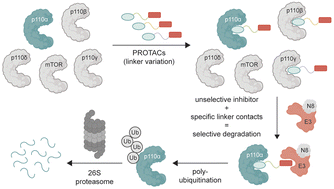/ News, Research, Doctorate/PhD, Publication
Turning a pan-inhibitor into a selective degrader

In our newest publication from Werner Jauslin, you can dive into a story where we turned a pan-selective PI3K inhibitor into a selective PI3Kα degrader by having a specific linker.
The story starts with the pan-PI3K inhibitor PQR514 from the Wymann-Group (Department of Biomedicine), which not only inhibits PI3Kα, but also PI3Kβ, γ, δ and mTOR among others. Based on that inhibitor and the work of Chiara Borsari who developed a covalent variant of this inhibitor, Werner went on a journey to develop a PROTAC that can not only inhibit PI3Kα, but remove it from the cell instead by dragging it to the degradation mechanism of the cell.
Although he started with only three cleverly designed linkers of which the middle one turned out to be a great degrader, he then went on to expand the linkers to explore the linkerology for this system in more detail by using many different techniques in collaboration with other team members (such as Matthias Schild, wo did the proteomic works) and members from the Wymann group (for the in cell westerns and the FRET-based binding assay). The findings can be summarized essentially as:
- The ideal linker must be 14 atom long.
- PEG linkers of the same length are worse ex vivo than in vitro.
WJ112-14 is a wonderful degrader of PI3Kα that does not degrade any other of the PI3K kinases. It is more powerful as the previously described PROTAC from Li et al, 2018 and has an IC50 of 40 nM in MCF7 cells according to the in cell western measuring the amount of downstream phosphorylations.
Surprisingly, a related inhibitor with a sterically more hindered was even stronger. So strong, in fact, that we nearly missed it in our initial screens as the hook effect was very strong and our standard concentrations were too high. Even at 1 nM, the western band for PI3Kα was completely gone. However, the compound also degraders PI3Kβ, but mainly at larger concentrations, making WJ213-14 still a selective degrader for PI3Kα.
Congratulations, Werner, Matthias and the rest of the contributors for this amazing story that got published in Chemical Science at the end of last year!
